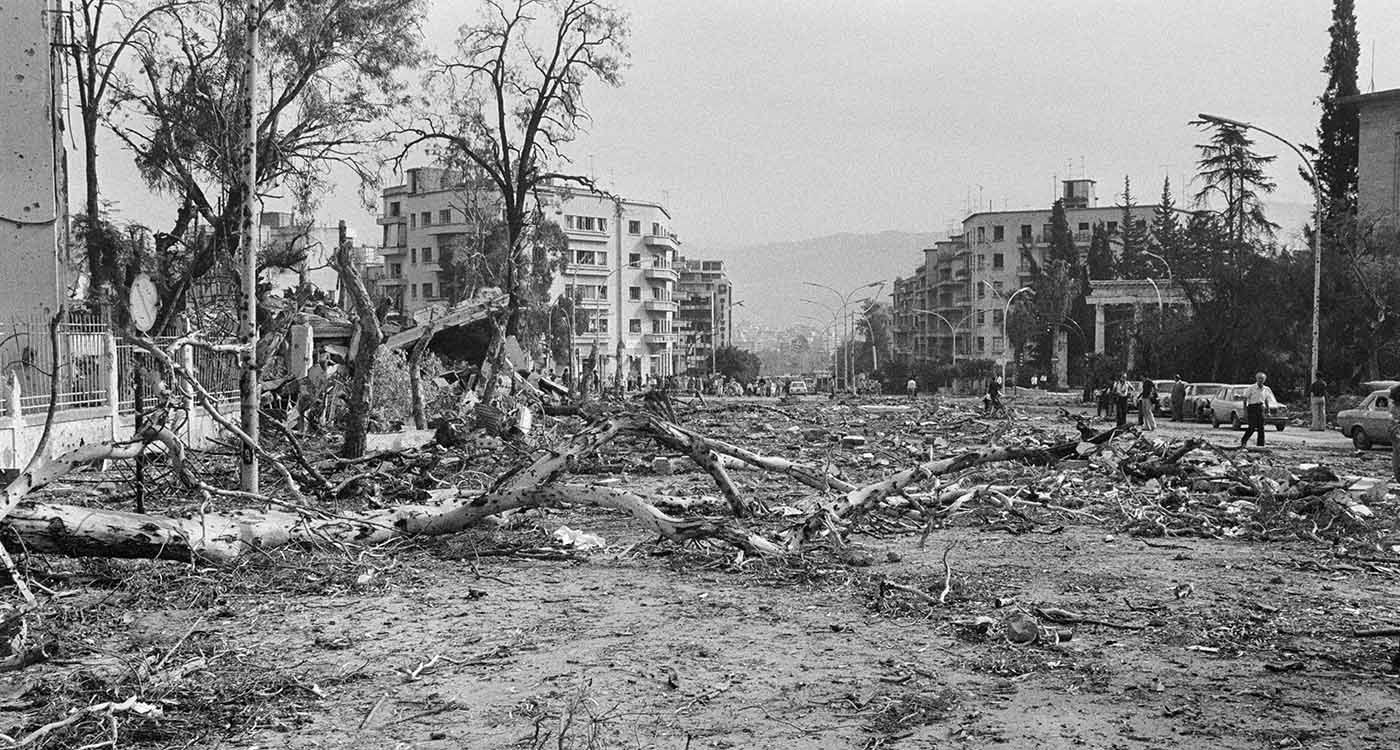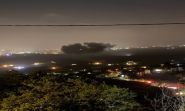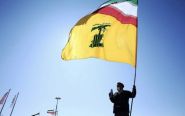
Fifty years ago, on April 13, 1975, Lebanon plunged into one of the darkest chapters of its history. For nearly fifteen years, the country was torn by a brutal civil war, fueled in part by direct foreign intervention. The human cost was staggering: around 150,000 people killed, thousands missing, and waves of people forced to flee. The economic fallout was just as severe, with losses estimated at $20 billion. This is Beirut revisits this painful era through the voices of Lebanese who had left the country and started over in France.
François Boustani remembers Sunday, April 13, 1975 — the day the Lebanese civil war began — with vivid clarity. “That day is etched in our memory,” recalls the cardiologist, who was in Zahleh, eastern Lebanon, at the time. “The phone rang that afternoon. My parents had friends over for lunch. It was my uncle, calling to warn my father that something serious was happening in Beirut.”
Kamal Tarabey was 27 then, a student at the Faculty of Arts at the Lebanese University in West Beirut. Now president of the Collectif libanais de France (CLF), he recalls: “We heard gunfire, and that Palestinians passing through Ain el-Remanneh — a Christian neighborhood — had been killed or wounded. But details were scarce. What struck me most was how quickly the streets emptied, as I made my way back home, to East Beirut.” Tarabey describes those years — from 1975 to 1978 — as a relentless cycle of violence: waves of fighting followed by ceasefires, fragile at best, before clashes erupted again.
Mona, a retired pharmacist, recalls that in 1975, when the fighting broke out, she was in her final year of secondary school, boarding at the Saints-Cœurs. Her parents were living in Côte d’Ivoire at the time. “When the schools closed, I had no choice but to leave Lebanon and finish my studies there,” she says.
Leaving Lebanon: A Painful Necessity
In 1975, François was a fresh graduate. “I was preparing for the entrance exam to the Jesuits’ Faculty of Medicine,” he recalls. But the war disrupted his plans, as the exam dates were repeatedly postponed due to the fighting. Faced with this uncertainty, and already enrolled in Montpellier for safety reasons, he decided to leave for France. His departure in October 1975 was marked by escalating security tensions. He remembers: “When fighting resumed in Beirut, I had no choice but to fly to Paris via Damascus. At that time, the Air France flight went from Damascus to Beirut to Paris. My father accompanied me to the airport in the Syrian capital, and we were part of a small group boarding the plane. During the stopover in Beirut, the plane filled with Beirut’s jet-set and foreigners fleeing Lebanon.”
France was also Mona’s destination. After completing her baccalaureate in Côte d’Ivoire, she decided to pursue pharmacy studies. French was a language she spoke fluently, having learned it from an early age.
In Lebanon, the war did not prevent Kamal from finding work as a journalist. He recalls: “I was hired by a newspaper. Since I lived in (Christian) East Beirut and had to cross the demarcation line every day, it became increasingly dangerous. So, we rented rooms in a hotel in Hamra, where we stayed.” He admits to having spent a year there, after which he says, “my situation became unbearable… I was often asked for my ID, which mentioned my religious denomination.” Kamal explains that he had to obtain a “pass from the PLO (Palestine Liberation Organization), which I had to hide when crossing into the eastern part of the capital.”
At the time, Kamal identified with the political left and supported “the political program of the Lebanese National Movement (a coalition of left-wing parties).” “But I soon realized it was taking on a more sectarian tone, and that’s when I distanced myself. I decided to return home, to the eastern part, and head for the mountains. The Palestinians helped me cross from the (Moslem) West to the (Christian) East, with an Armenian driver who shuttled between the two regions.” Kamal notes that “at that time, Armenians were perceived as neutral.”
After moving to the eastern part, Kamal recalls that “the presence of the Kataëb grew increasingly oppressive.” “At one point, I heard they were recruiting young people into the militia... to defend the Christian society.” “The Kataëb entered the hotel district (in downtown) Beirut and gained the upper hand militarily. That’s when I realized I had to leave the country. I could no longer identify with this war, which was taking a sectarian turn,” Kamal added.
Settled in France, Never Looking Away from Lebanon
Settling in Montpellier wasn’t easy for François. “Everything felt smaller, gloomier. It was exile — made even harder by the constant images of destruction coming from Beirut. As we used to say, Lebanon was in flames. We saw familiar places burning on TV,” he recalls. But exile soon gave way to refuge. “My fellow Lebanese students and I were met with genuine warmth and solidarity from the people of Montpellier.”
Unlike many who had left Lebanon, François continued to visit regularly during the war. These trips, he says, offered a vivid glimpse for the Lebanese diaspora. “We’d go to Larnaca to catch the boat to Jounieh. On board were Lebanese from all over the world. Though we came from the same village, the same neighborhood, the same school, year after year we began to change—shaped by the countries we had moved to. The one working in Saudi Arabia wore gold jewelry, the one from Paris was a little snobbish, and the one living in Canada wore a parka,” he recalls.
Mona arrived in France in 1977 to continue her studies. “Back then, there was no internet or mobile phones. We had to send letters by post from Côte d’Ivoire to French universities, which only accepted about ten foreign students each year. So, I wrote to every faculty across the country,” she recalls. She eventually secured a spot at a university in eastern France, where she settled with the help of a cousin studying medicine.
Before the era of mobile phones, she explains, “we called our families from public phone booths. To reach Lebanon, we had to go through an operator who connected us.” Her early days in France were challenging. “I had to learn to live on my own. Speaking French was an asset, but I still had to adapt to the culture, understand the French way of life and figure out how to use public transport,” she says. “We thought about Lebanon often, but over time, I became more focused on settling into life in France.”
After earning her pharmacy degree, but lacking a Lebanese high school diploma, Mona found herself “between a rock and a hard place.” “In Lebanon, I couldn’t get my diploma validated because I had completed my baccalaureate abroad. Since my high school diploma wasn’t valid in Lebanon, my degree wasn’t either. Furthermore, in France, I couldn’t work as a pharmacist unless I was a French citizen.” Mona applied for French citizenship, found a job in the pharmaceutical industry, and was naturalized after three years.
"I Left Lebanon, But Lebanon Never Left Me"
Despite being well integrated into life in France, Lebanon remained at the heart of François' concerns. "We were always familiar with what was happening in Lebanon," he explains. “What had initially seemed like a temporary stay gradually became permanent. I never imagined I would stay in France. I was a Lebanese student in France. But by the mid-1980s, I realized that the Lebanon I had known was no longer there. From that point, I became French, though still Lebanese at heart." Now a cardiologist and president of the French-Lebanese Association for Cardiovascular Pathology, François remains deeply connected to his heritage. "I left Lebanon, but Lebanon never left me," he says, quoting a sentiment frequently expressed by fellow Lebanese. François Boustani is also the author of several books, including Liban: Genèse d’une Nation Singulière (Éditions Erick Bonnier, 2020), and was awarded the Grand Medal of Francophony by the French Academy in 2017.
Mona spent seven years away from Lebanon, from 1977 to around 1985, as traveling to the country was difficult at the time. “To get to Lebanon, you had to pass through Cyprus. I had my grandparents, uncles, aunts, and cousins there… and, of course, I stayed in touch with them,” she recalls.
Meanwhile, Kamal initially considered moving to Australia, where his brother was already living. “The Australian embassy informed me that immigration was temporarily suspended,” he recalls. However, in the meantime, he received a call from Radio Monte-Carlo in Paris (now Monte-Carlo Doualiya, MCD). “They told me there would be work for me in Paris.” In 1979, Kamal Tarabey left Lebanon, moved to Paris, and began working at Radio Monte-Carlo, where he built his entire career and eventually became editor-in-chief. “Our generation went through a lot. We faced many setbacks and witnessed the collapse of our dreams and ideals,” he adds.
A Lebanese Society Driven by Appearances
Since the end of the war, officially concluded with the Taëf Accords in October 1989, Lebanon has managed to recover. However, it has since endured years of economic and political crises, a "revolution" in October 2019, and two direct wars between Hezbollah and Israel, in 2006 and 2024. The year 2020 brought further challenges with the Covid-19 pandemic and the disastrous explosion at the Beirut port. But fifty years after the outbreak of the war, how can we define Lebanese society today?
François believes that "despite outward appearances, the Lebanese share much in common. They all come from an Oriental foundation, where countless ways of living and dying have crystallized over the ages. The vast majority embrace a society that is liberal, family-oriented, and patriarchal, with a strong emphasis on piety. However, the issue lies in the narratives each community constructs about itself and its relationship with others. These narratives often perpetuate ancient fears, distrust, resentments, misunderstandings, and tribal rivalries." He notes, however, that "paradoxically," the war "brought communities close in many ways," and that the Lebanese have "learned and matured through 50 years of suffering." He describes the younger generation as “interesting,” adding, "They have an incredible vitality and drive to succeed." Nevertheless, he remains critical of Lebanese society, describing it as marked by "a harsh materialism and profound superficiality."
In 1998, eight years after the war ended, Mona decided to return to Lebanon and settle there with her children, hoping to instill Lebanese traditions in them. However, she stayed only two years before returning to France. "The insecurity in the region, combined with the differences in how the labor market functioned, led me to prioritize my children's future in France, a country governed by the rule of law," she explains.
Mona describes Lebanon as a "magical country" renowned for its hospitality and the ease with which social connections are formed. "The sunny climate and the joy of driving along the coast every morning to work were truly a pleasure. Lebanon is abounding with creative energy and remarkable resilience, and I deeply admire the courage and adaptability of the Lebanese people," she says. However, she observes that today's Lebanese society is "largely focused on appearances," with each community living in isolation and failing to truly understand one another.
Even after nearly five decades in France, where she has fully integrated, Mona still feels like a "stranger" due to cultural and behavioral differences. She experiences a similar sense of alienation when visiting Lebanon, where she points to "the disregard for human rights, the plight of the elderly, and the requirement to pay upfront for medical treatment." She further explains that she does not feel secure in Lebanon, "since I can only rely on myself, with no strong state to ensure the protection of human rights." She observes that these harsh realities sharply contrast with "the beauty and magic of the country."




Comments